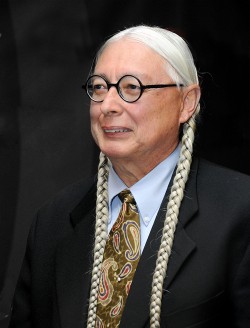Attorney and Native American rights advocate Walter Echo-Hawk to speak at PSU
Walter Echo-Hawk views himself as a foot soldier in the advocacy movement for the indigenous rights of Native Americans. His weapon of choice: the law.
Attorney and Native American rights advocate Walter Echo-Hawk to speak at PSU
Walter Echo-Hawk views himself as a foot soldier in the advocacy movement for the indigenous rights of Native Americans. His weapon of choice: the law.
Attorney and Native American rights advocate Walter Echo-Hawk to speak at PSU
Walter Echo-Hawk views himself as a foot soldier in the advocacy movement for the indigenous rights of Native Americans. His weapon of choice: the law.

Echo-Hawk is an attorney who has spent the last 40 years working on various cases, representing native people across the country. But he’s not alone—a fact he humbly points out.
“When I got out of law school in 1973, there were maybe one or two dozen native attorneys. There are now thousands of native legal practitioners out there, representing pride, tribal judges,” he said.
Echo-Hawk will visit Portland State Friday, May 4, on invitation from the Native American Student and Community Center. He will discuss his newly published book, In the Courts of the Conqueror: The 10 Worst Indian Law Cases Ever Decided, and his work in native advocacy.
Echo-Hawk’s book studies several cases in American law, detailing the parties and the stakes involved. He analyzes the many factors that went into the legal decisions that ultimately served to use the law against native people rather than for their protection.
The book, according to the author, is “an everyman’s book,” written for the common reader in an attempt to understand the effects of American law on indigenous people.
“It’s a unique study of the law written for the general public,” he said. “It studies the dark side of federal Indian law. It peers into the structural weaknesses in that body of law to try to understand the forces at work, to produce an amazing prevalence of unjust cases affecting native people in American history.”
Echo-Hawk described one such case, Employment Division v. Smith (1990), in which a native man, Alfred Smith, was fired from his job for the use of peyote in a religious rite.
The case traveled between the United States and Oregon Supreme Courts several times before the U.S. Supreme Court ultimately ruled against Smith. The ruling asserted that religious motivation could not be grounds for violation of neutrally-applied laws.
“On the second trip to the Supreme Court, they handed down a ruling that denied First Amendment protection for this peyote religion,” Echo-Hawk explained. “They carved out exceptions in the First Amendment, wherein they would exempt all criminal and civil statutes that were not specifically hostile to religions from the reach of the First Amendment.”
The U. S. Supreme Court, according to Echo-Hawk, has become one of the greatest challenges for native advocacy in recent times.
“It’s been a trend since 1985 to trim back native rights, and tribes are losing about 80 percent of their cases before the court,” he said. “It’s done a lot of damage to the principle of federal Indian law, which is the legal framework for the rights of the modern Indian nation.”
But despite these challenges, Echo-Hawk believes the overall arc of advocacy for native rights has been one of progress. He pointed to gains both political and economic, as well as the rise of the modern indigenous nations.
“I think that Indian tribes have made tremendous progress during this modern era,” he said. “During the tribal sovereignty movement of the 1970s, we witnessed the rise of modern Indian nations all over the U.S. They’ve been very vigorous in terms of exercising their tribal sovereignty over their territories and people.”
“Really, we’ve seen one of the great American social movements,” he added, comparing it to the civil rights and women’s rights movements of the 20th century.
Echo-Hawk is excited about visiting PSU and the Native American Student and Community Center, which organized the event as part of its 10th anniversary events series honoring indigenous student success.
“I haven’t collected my thoughts yet about exactly what I’ll say,” he laughed. “But I hope to do a good job for the Native American program and to meet friends and colleagues at the same time.”
For native students, he offered this advice: “Every native student is of necessity a warrior and an advocate for their indigenous issues, regardless of what profession they’re going into. You will probably be called upon in the course of your life to do advocacy for native people,” he said. “The students of today are the leaders of tomorrow—so study hard and pay attention to your culture.”
I admire Native men who can step up to the plate and take on strikes for our native people who struggle with diversity, poverty, and knows our Native American rights that have been violated against us as native people of this land. I feel it is important for other people to listen to what he has to say and be aware of the important things that are important to us. He is a great man I admire for doing this! It takes a lot of courage, and have that
ability to speak from the heart and say what he feels from it. Thank you!